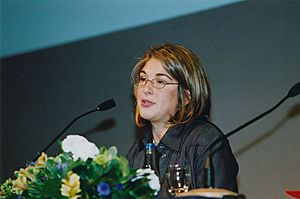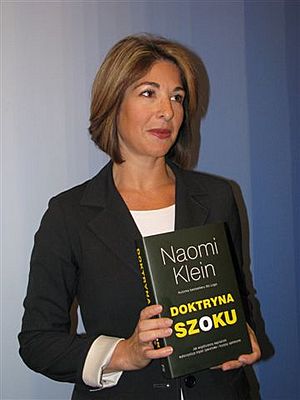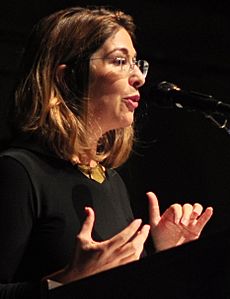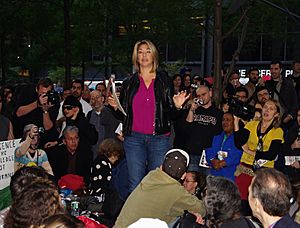Naomi Klein facts for kids
Quick facts for kids
Naomi Klein
|
|
|---|---|
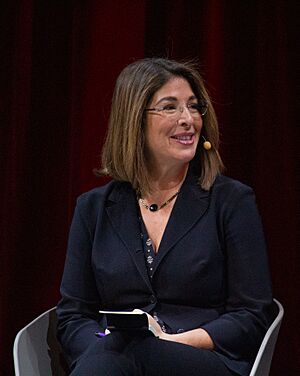
Klein in 2017
|
|
| Born | May 8, 1970 Montreal, Quebec, Canada |
| Occupation | Author, activist, professor, filmmaker |
| Alma mater | University of Toronto (withdrew) |
| Period | 1999–present |
| Genre | Nonfiction |
| Subject | anti-war, anti-globalization, organized labour, feminism, anti-Zionism |
| Notable works | This Changes Everything, No Logo, The Shock Doctrine, Doppelganger: A Trip into the Mirror World |
| Spouse | Avi Lewis |
| Children | 1 |
| Parents | Bonnie Sherr Klein, Michael Klein |
Naomi Klein (born May 8, 1970) is a Canadian author, social activist, and filmmaker. She is known for her writings and ideas about big companies, fairness, and climate change. In 2021, she became a professor at the University of British Columbia. She also helps lead the Centre for Climate Justice.
Klein first became known for her book No Logo (1999). This book looked at how big brands affect our lives. She also co-wrote and produced The Take (2004). This documentary film was about factory workers in Argentina. Her book The Shock Doctrine (2007) explored how big changes happen during times of crisis. It became a very important book.
In 2014, Klein wrote This Changes Everything: Capitalism vs. the Climate. This book was a bestseller and won an award. In 2016, she received the Sydney Peace Prize for her work on climate justice. She is often named as one of the world's most influential thinkers.
Contents
- Family and Early Life
- Main Works
- No Logo
- Fences and Windows
- The Take
- The Shock Doctrine
- This Changes Everything: Capitalism vs. the Climate
- No Is Not Enough: Resisting Trump's Shock Politics and Winning the World We Need
- The Battle for Paradise: Puerto Rico Takes on the Disaster Capitalists
- On Fire: The (Burning) Case for a Green New Deal
- Doppelganger: a Trip into the Mirror World
- Views and Activism
- Other Activities
- Honours and Awards
- List of Works
- See also
Family and Early Life
Naomi Klein was born in Montreal, Quebec. Her family has a history of working for peace. Her parents moved from the United States in 1967. They were against the Vietnam War. Her mother, Bonnie Sherr Klein, is a documentary filmmaker. Her father, Michael Klein, is a doctor. He is part of a group called Physicians for Social Responsibility. Her brother, Seth Klein, is also an author.
Her grandparents were involved in social justice before World War II. They believed in fairness and equality. Klein's father grew up learning about these ideas.
Naomi Klein is married to Avi Lewis. He is a TV journalist and filmmaker. His family is also well-known in politics and journalism. Naomi and Avi have one son named Toma.
Growing Up and Education
When she was a teenager, Naomi Klein was very interested in shopping and designer clothes. She did not like politics much at that time.
Two things changed her way of thinking. When she was 17, her mother had a stroke and became very ill. Naomi and her family took care of her. This experience made her think differently about life. The next year, in 1989, a terrible event happened. Many female engineering students were killed in the École Polytechnique massacre. This event made her realize the importance of feminism.
Klein started writing for her student newspaper at the University of Toronto. She became the editor-in-chief. She later left university to work as a journalist. She worked for The Globe and Mail and This Magazine.
Main Works
No Logo
In 1999, Klein published No Logo. This book became very popular for people who questioned big corporations. In the book, she criticized how large companies use their brands. She also wrote about how some companies might treat workers unfairly in poorer countries. No Logo became a worldwide bestseller. It sold over one million copies.
Fences and Windows
Fences and Windows (2002) is a collection of articles and speeches by Klein. These writings are about the movement against corporate globalization. All the money from this book goes to help activist groups.
The Take
The Take (2004) is a documentary film. Klein and her husband, Avi Lewis, made it together. The film is about factory workers in Argentina. They took over a closed factory and started running it themselves.
The Shock Doctrine
Klein's third book, The Shock Doctrine: The Rise of Disaster Capitalism, came out in 2007. The book suggests that some economic policies are put in place during times of crisis. These crises can be economic problems, wars, or natural disasters. The idea is that when people are in shock, big changes can be made quickly without much debate. The book became a bestseller around the world.
The book argues that when a society faces a big "shock," people want quick solutions. This desire for fast action can be used by some to push through unpopular policies. These policies might not even be related to the disaster. The book suggests that sometimes these shocks are even encouraged.
The Shock Doctrine was made into a short film. It was also made into a longer documentary film. The book made Klein even more well-known. In 2009, it won the Warwick Prize for Writing.
This Changes Everything: Capitalism vs. the Climate
Klein's fourth book, This Changes Everything: Capitalism vs. the Climate, was published in 2014. This book argues that our current economic system makes it hard to stop climate change. It suggests that we need big changes to protect the environment. The book won the 2014 Hilary Weston Writers' Trust Prize for Nonfiction.
No Is Not Enough: Resisting Trump's Shock Politics and Winning the World We Need
Klein's fifth book, No Is Not Enough, was published in 2017. In this book, she talks about the need for big changes. She suggests that we need bold new ideas to create a better world. Klein also questions the idea that rich people always know how to solve global problems.
The Battle for Paradise: Puerto Rico Takes on the Disaster Capitalists
The Battle for Paradise was released in 2018. It looks at what happened in Puerto Rico after Hurricanes Irma and María. Klein uses ideas from The Shock Doctrine to describe the recovery efforts. She writes about how some people tried to profit from the disaster.
On Fire: The (Burning) Case for a Green New Deal
In 2019, Klein published On Fire. This book is a collection of essays about climate change. It talks about the urgent actions needed to protect our world. Klein writes about meeting Greta Thunberg and how young people are speaking up for climate action. She supports the Green New Deal.
Doppelganger: a Trip into the Mirror World
Doppelganger was released in 2023. It is a book where Klein explores how she is often confused with another writer, Naomi Wolf. Klein uses this experience to look at how our world is divided. She suggests that different groups of people feel like they live in a "mirror world" from each other. The book was well-received and won the first Women's Prize for Non-Fiction in 2024.
Views and Activism
Views on Conflict
Klein has written about the Iraq War. She argued that the U.S. government had a plan to create a free market economy in Iraq after the invasion. She described how foreigners were allowed to take wealth from Iraq.
She also signed a petition supporting Hugo Chávez in Venezuela in 2004. She saw his policies as protecting people from economic problems.
Views on Israel
In 2009, during the Gaza War, Klein supported the Boycott, Divestment and Sanctions (BDS) campaign against Israel. She believed that this global movement could help end the conflict. She visited Israel, the West Bank, and Gaza to promote her book and the BDS campaign. She said it was important to boycott the "normalization" of the conflict, not Israelis themselves.
In 2023, during the Gaza war, she wrote about her views on the conflict. She spoke at an event in 2024, using the story of the golden calf from the Bible. She compared it to what she called "the false idol of Zionism." She said this "false idol" turns stories of justice into tools for conflict.
Environmentalism
Since 2009, Klein has focused a lot on environmentalism and climate change. Her book This Changes Everything is about this topic. She believes that the climate crisis can lead to big economic and political changes.
She was on the board of directors for the group 350.org. This group works to encourage people to stop investing in fossil fuels. Klein believes that the financial crisis and the climate crisis are both caused by too much corporate greed. She spoke at Occupy Wall Street in 2011. She said that we act as if there are no limits to fossil fuels. But we act as if there are limits to the money needed to build a better society.
Klein has strongly criticized the Athabasca oil sands in Alberta, Canada. She calls it a form of "terrestrial skinning." In 2011, she was arrested at a protest against the Keystone XL pipeline. She celebrated when the decision on the pipeline was delayed.
She attended the Copenhagen Climate Summit in 2009. She blamed the failure of the summit on President Barack Obama. She also called Canada a "climate criminal."
After Hurricane Sandy, she warned that the climate crisis could be an opportunity for companies to profit from disasters. But she also said it could be a chance for positive change. In 2016, after Donald Trump became president, Klein called for economic actions against the U.S. if it did not follow the Paris Agreement on climate change.
In 2022, Klein wrote about the COP27 in Egypt. She criticized the Egyptian government's actions against activists. She said the climate movement should not ignore these issues. She also called for the release of activist Alaa Abd El-Fattah.
Other Activities
Klein writes for many publications, including The Nation and The Guardian. She is also a senior writer for The Intercept. She has given lectures at the London School of Economics. From 2018, she held a special teaching position at Rutgers University–New Brunswick.
She was involved in the 2010 G-20 Toronto summit protests. She spoke out against police actions during the protests. In 2011, she visited Occupy Wall Street. She called the protest movement "the most important thing in the world."
Klein was a key person behind the Leap Manifesto. This is a political plan for Canada. It focuses on dealing with climate change, inequality, and racism. The manifesto has influenced the Green New Deal.
In 2019, Klein signed a letter supporting Labour Party leader Jeremy Corbyn. She described him as a "beacon of hope" against nationalism and racism.
Honours and Awards
- 2009: Warwick Prize for Writing, for The Shock Doctrine
- 2011: Honorary doctorate, Saint Thomas University
- 2011: Time magazine's list of Top 100 Non-Fiction books published since 1923, No Logo
- 2014: Hilary Weston Writers' Trust Prize for Nonfiction for This Changes Everything
- 2014: The Observer 'Book of the Year', This Changes Everything
- 2014: The Guardian Readers' 10 best books of 2014, for This Changes Everything
- 2016: Sydney Peace Prize
- 2017: No Logo – Number 3 on The Guardian's list of the Top 100 Non Fiction books of all-time
- 2019: Honorary doctorate, University of Amsterdam
- 2021: The Neil Postman Award for Career Achievement in Public Intellectual Activity, Media Ecology Association
- 2023: The Guardian's Best Ideas Books of 2023, Doppelganger
- 2024: Women's Prize for Non-Fiction for Doppelganger
List of Works
Filmography
- The Corporation (2003) (interviewee)
- The Take (2004) (writer)
- The Shock Doctrine (2009) (writer)
- Catastroika (2012) (appearance)
- This Changes Everything (2015)
See also
 In Spanish: Naomi Klein para niños
In Spanish: Naomi Klein para niños
- Alter-globalization
- Leap Manifesto
- Green New Deal
 | Dorothy Vaughan |
 | Charles Henry Turner |
 | Hildrus Poindexter |
 | Henry Cecil McBay |


